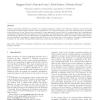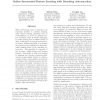1047 search results - page 80 / 210 » Learning the required number of agents for complex tasks |
NIPS
2007
13 years 9 months ago
2007
We consider apprenticeship learning—learning from expert demonstrations—in the setting of large, complex domains. Past work in apprenticeship learning requires that the expert...
ECAI
2004
Springer
14 years 1 months ago
2004
Springer
It is possible to model avatars that learn to simulate object manipulations and other complex actions. A number of applications may benefit from this technique including safety, e...
AUTOMATICA
2011
13 years 2 months ago
2011
Iterative distributed algorithms are studied for computing arithmetic averages over networks of agents connected through memoryless broadcast erasure channels. These algorithms do...
JMLR
2012
11 years 10 months ago
2012
While determining model complexity is an important problem in machine learning, many feature learning algorithms rely on cross-validation to choose an optimal number of features, ...
ACMICEC
2006
ACM
13 years 11 months ago
2006
ACM
In this paper, we look at a supply chain of commodity goods where customer demand is uncertain and partly based on reputation, and where raw material replenishment is uncertain in...


